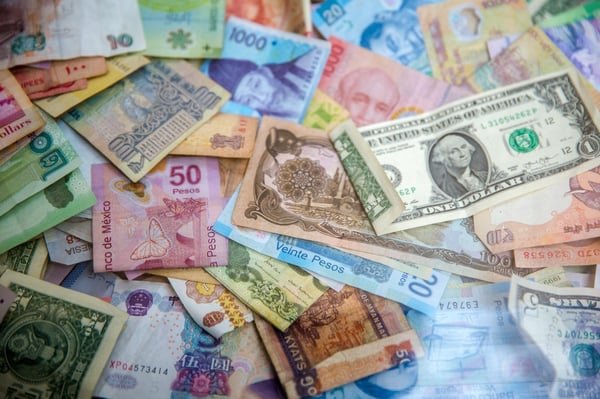Are you the only person reading this sentence right now? Most of us wouldn't have a clue if our screens were being “shoulder-surfed†in a public place or if our data was being hijacked on an unsecured network. But every time we pick up our phones - and most of us do so every four minutes on average - we should be on the alert for scammers. For peace of mind online, take a minute or two to review the most common security threats targeting your devices.
You'll have to read on to the end of this article to find out how CurrencyFair keeps your international transfers safe and secure. But if you want to find out how we offer bank-beating rates at fixed fees when you send money overseas, you're in the right place already.
Online fraud is big business. Cyber-scams cost victims over $6.9 billion a year worldwide, and hackers are relentless in targeting any available weakness. If they can hack tech giants (Microsoft), space agencies (NASA), and even entire countries (Estonia), they can find a way into the smartphone in your pocket.
Unless, that is, you know the risks, follow our tips on securing your accounts, and take stock of just how much valuable data is stored on your phone, tablet or laptop.
Scammers in numbers
-
Nearly one in three Americans have fallen victim to a mobile phone scam.
-
Although the average cost of a phone scam is $567, some people have lost their life savings in seconds.
-
3.4 billion phishing emails are sent every day.
-
Small businesses in the United Kingdom are targeted by hackers every 19 seconds on average.
What are the most common online scams?
The term “online scams†covers a mind-boggling array of sophisticated cyber-attacks, identity theft and online fraud. If you don't know the names yet, don't worry. The priority is to spot the warning signs.
Romance scams from hackers without a heart
Most of us might think we're wise to the charms of a lonely oil rig worker or international playboy who needs emergency cash, but the latest romance scams can call on the skills and resources of sophisticated criminal gangs. That's certainly the case for “pig-butchering†crypto scams, which are run by organised gangs and target retirees and seniors in particular. The bait is nearly always the same: a pretty young lady with a curious passion for crypto-currency. The damage can be staggering. Romance scams cost the over 60s more than US $139 million in 2020, while the median loss for the over 70s is $9,000.
The golden rule: Never send money to anyone you've met online whose details or backstory you can't verify, however deeply in love they claim to be.
Advance fee scams
It feels as if 419 scams - the long, elaborate “Greetings, Friend!†emails from princes and government officials in exotic locations - belong to the dial-up internet era, but they're back. In fact, advance-fee scams surged by 80% in 2022. They work by requesting a small payment or transfer in order to release a fortune, sweepstake prize or insider market tip. Be suspicious of any offer that seems too good to be true, yet is sent to a seemingly random stranger.
The golden rule: If you want to see your money again, stick to making your international transfers with a licensed payment institution… like CurrencyFair!
Bogus virus alerts
You're browsing online when a pop-up suddenly warns you that (according to a scan) your phone or laptop is infected with a potentially critical virus. However, if you download an antivirus pack without delay, your personal data can be secured. In fact, the exact opposite is the case. You'll most likely be downloading malware or spyware that will snoop on your stored passwords and saved bank details.
The golden rule: Keep your device operating system and antivirus software updated and only scan for issues with trusted software.
Smishing ‘n phishing attacks
These are arguably the most common type of online scam because they're simple and cheap for fraudsters to deploy at scale. They start with an unsolicited message by SMS (smishing) or email (phishing) that invites you to click on a link or download an attachment. Given that most of us don't even open the messages we do recognise, these scams need to work harder to trick us:
-
They will appear to be from an authentic-looking, trusted source (eg. bank, government agency, utility company).
-
They dangle a big bait (eg. prize, package delivery) or warn of an imminent threat (eg. compromised bank account, tax investigation) that sparks curiosity.
-
They're relentless, meaning that there's always a chance they'll catch us when we're distracted.
The golden rule: Check the policies of the company in question. For example, CurrencyFair will NEVER ask you for your password, credit/debit card information, or bank details via email. All account updates and transactions are done by logging directly into your CurrencyFair account via app or desktop.
Vishing or robocalls
Studies show that 8 out of 10 mobile phone owners now prefer not to answer any calls whatsoever from unknown numbers. Blame vishing. Scammers posing as car insurers, tax authorities, banks, utility companies, or tech support (to name a few), cold call with urgent requests to confirm personal details or transfer your savings to a safe account. Unfortunately, they can be extremely good at what they do and are convincing enough for victims to ignore the red flags.
The golden rule: Don't answer unsolicited calls, and don't speak if you did. Hang up and call the company claiming to contact you using the number you normally use.
SIM-swapping
This is a sinister scam that is particularly galling for anyone who's taken the extra precautions of enabling two-factor authentication. Using personal information or details they might have obtained by phishing, social media hacking or otherwise, hackers get your mobile phone provider to activate a second SIM card with your number. When you next try to log into an account, the PIN code will be sent to their phone, not yours, allowing them to get in, cause havoc, and lock you out.
The golden rule: Secure your phone with a code or biometric authentication, and contact your provider immediately if you notice strange log-in attempts or have difficulty sending and receiving text messages.
Seasonal scams
It's not just the big retailers planning big Black Friday or Valentine's Day campaigns. Criminal gangs are also poised to take advantage of their victims' heightened sense of goodwill, increased spending habits, or impatience to receive a package or delivery. Watch out for Facebook Marketplace scammers, bogus charities soliciting donations, or fraudulent retailers asking you to send money for extra customs or delivery fees.
The golden rule: Bring a healthy dose of scepticism to any festive season, to the point of assuming everything is a scam until proven otherwise.

How to protect yourself from the most common online scams
The only thing that's worse than being scammed is someone reminding you how naive you've been. You can deny fraudsters and critics the pleasure by following these tips:
Email: Don't click on links or download attachments without virus-scanning, hover your mouse over the sender name to check the address, and watch out for emails with odd grammar or spelling mistakes, or any that don't address you by name.
Phone: Hang up and call back. Spoofing means that you can't necessarily trust the number that appears on screen, so the safest option is to call the number you know for that business. As with email, don't click on links or download attachments, and block suspicious numbers automatically in your phone settings.
Online: Avoid using unsecured public Wi-Fi (where your data can be intercepted) or entering PINs or passwords in public (where shoulder-surfers can spy on them). Only trust https-encrypted websites with the padlock icon in the search bar, and use different (smart) passwords for each account.
General: Make a mental note of which banks, insurers or institutions hold the most valuable data or accounts for you. Then check their communication policies, which they will either have sent to you in an email, or list on their website. For example, most (including CurrencyFair) will explicitly state how they will and will not contact you.
Apps: Be careful too when downloading apps from the Apple or Android store. Cyber-criminals can create bogus versions of recognisable apps whose sole purpose is to flood your phone with malware and steal your details. Only download verified apps from trusted sources and take the time to study the permissions you're giving any app before installing.
How CurrencyFair keeps you safe online
We're committed to providing bank-level security with every transfer, but we also build robust security features into the way we communicate with our customers.
-
When you create an account, you will be asked to provide an email address and a strong password.
-
We also provide you with a 6-digit PIN.
-
We require two-factor authentication as standard. Whenever you make a money transfer, we will send you a message to your phone with a code.
-
Our website uses 256-bit encryption via SSL from VeriSign.
-
We run regular security checks on our own data servers to protect against malicious attacks.
-
Identify verification is mandatory for new customers to ensure accurate customer data.
-
You will be automatically logged out of your account after a period of inactivity, so there's less risk if you have to leave a device unattended.
-
No one can make changes to your personal details without your contact information authorisation.
-
All transactions are reported to your email address.
If you do receive a suspicious email relating to your account or transaction, we urge you to forward it to our Support Centre for review.
There is no “typical†profile of an online scammer or a fraud victim, and nobody should consider themselves too wise or wily to be above risk. With many of the scams above, your bank may be under no obligation to refund you any sums lost, especially where they can show that you (unwittingly) authorised the transfer. For that reason, it always pays to be too cautious.
Now you know how CurrencyFair keeps your international transfers safe and secure, find out how to cut the hidden fees and fuss too. Send money abroad with the peace of mind that you're getting a secure service, with bank-beating rates.
This information is correct as of February 2023 This information is not to be relied on in making a decision with regard to an investment. We strongly recommend that you obtain independent financial advice before making any form of investment or significant financial transaction. This article is purely for general information purposes. Photos by stephen momot and Thom Holmes on Unsplash








%20(1).jpg?width=600&name=tim-trad-BYPMtjYMEyk-unsplash%20(2)%20(1).jpg)




